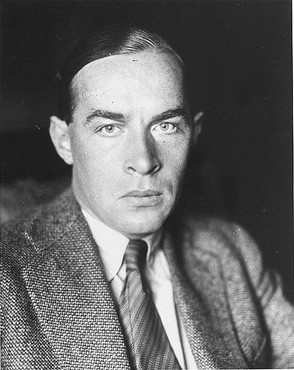
Erich Maria Remarque
In 1933, Nazi students at more than 30 German universities pillaged libraries in search of books they considered to be "un-German." Among the literary and political writings they threw into the flames were the works of Erich Maria Remarque.
Excerpt
We count the weeks no more. It was winter when I came up, and when the shells exploded the frozen clods of earth were just as dangerous as the fragments. Now the trees are green again. Our life alternates between billets and the front. We have almost grown accustomed to it; war is a cause of death like cancer and tuberculosis, like influenza and dysentery. The deaths are merely more frequent, more varied and terrible.
—Im Westen nichts Neues (All Quiet on the Western Front), Erich Maria Remarque, 1929
Fire Oath
"Fire oaths" were statements to be read as books were tossed to the flames. The German Student Association sent out a circular containing these statements before the book burnings. The fire oaths then accompanied the burning of works written by the individual authors named in the statements.
Against literary betrayal of the soldiers of the World War
For the education of the nation in the spirit of standing to battle
Erich Maria Remarque
Which of Erich Maria Remarque's Works were Burned?
All works published before May 1933
Who was Erich Maria Remarque?
Among the first books singled out for banning or burning in Nazi Germany were volumes that championed pacifism and anti-militarism. No other work represented these tenets more forcibly than All Quiet on the Western Front by German author Erich Maria Remarque (1898–1970). Translated into dozens of languages, with sales exceeding 3.5 million in the first two years in Germany alone, the novel was made into a classic Hollywood film.
Although Remarque was himself a World War I veteran wounded in action, his realistic novel provoked a separate "fire oath," which branded the story of a young German soldier killed during World War I "a literary betrayal of the soldiers of the world war." Vilified by German nationalists and Nazis, particularly after the film appeared in 1930, Erich Maria Remarque left Germany for Switzerland in 1932 and immigrated to the United States in 1939.
Critical Thinking Questions
- If Jews were the principal target during the Holocaust, why were books written by non-Jewish authors burned?
- How did the German public react? What was reaction like outside of Germany?
- Why do oppressive regimes promote or support censorship and book burning? Why might this be a warning sign for mass atrocity?

